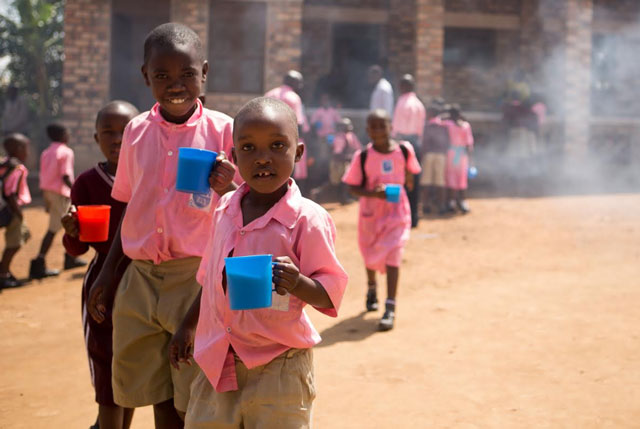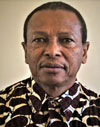
*The writer is the Country Director of the United Nations World Food Programme (WFP) in Uganda. The column is written on behalf of 34 agencies participating in the UN-led joint appeal against the impacts of COVID-19 in Uganda
COMMENT | El-Khidir Daloum | WFP | One sunny day in June 2019, in Uganda’s most impoverished north-eastern region of Karamoja, two schoolgirls dared to dream. There on the grass where they placed their plates to eat lunch – for lack of a dining hall at Atedeoi Primary School – 13-year-old Lucy Dengel told us: “I would like to become a nurse.”
Her schoolmate, Chegem Lomuria, an orphan unsure of her age who is lame in both legs, said that she would like to become a “madam,” meaning a schoolteacher.
Uganda’s lockdown due to the COVID-19 outbreak has brought school feeding to a near complete halt, leaving Lucy, Chegem and more than 130,000 Karimojong children hungry during the lean season.
UN-supported school feeding is often the only meal most children get to eat in a day during the lean seasons in Karamoja. It contributes to keeping children in school while reducing the burden on their families at a time when food prices and rates of severe malnutrition among children typically rise.
When we went back looking for the girls this month, Lucy’s home was unreachable due to flooding of the Moroto River after sustained torrential rains. Two people had been swept away by the water in one day.
Chegem, whose home is a few metres away from Atedeoi school, was not at home. The neighbours said she had been taken 95 kilometres away on a donkey during the lockdown, along with her elderly grandmother, to live near a kraal, or huts surrounded by a fence, where they could regularly get goat’s milk for nourishment. Chegem was so malnourished that neighbours tried to enrol her in a feeding programme that only admits much younger children.
In Karamoja, such migrations because of a lack of food often cause girls to quit school for good.
The threat of floods
Another cause for hunger in Uganda is the extremes in weather patterns. Floods are an immediate threat to accessing food and sustaining agricultural livelihoods in recent months in many parts of the country. Floods displace families, damage homes and roads and inundate crops mainly in the mountainous regions of Bugisu, Rwenzori and Kigezi, in addition to Karamoja. While COVID-19 has not yet spread to these areas, the risk of infection will complicate how WFP assists in restoring agricultural livelihoods.
To complicate matters, swarms of desert locusts have been laying eggs in Karamoja and other parts of northern Uganda during the main planting season from March to April. Young locusts are known to devour crops, but restrictions to movement to contain the COVID-19 outbreak across the country have hampered efforts to kill them.
The COVID-19 outbreak has exposed worrying vulnerabilities around nutrition and hunger in Uganda in the Decade of Action. Nevertheless, if the UN and our civil society partners can secure US$71.4 million from donors – as part of a larger humanitarian and development appeal against the COVID-19 impacts – we can assist Uganda in improving access to nutritious food during this crisis and focusing on the most vulnerable people.
International support key
We have the technical capacity to support the Government of Uganda to take on challenges related to school feeding, market support, the regulation of food prices, agricultural production and livelihoods, as well as malnutrition. If adequately funded, our support will also complement the efforts of the government in providing emergency food rations in urban areas as a stopgap to prevent hunger.
But without international support, we cannot implement innovative ways to feed school children, coordinate food distribution in COVID-19 isolation centres or provide grants to small agricultural enterprises led by women. Just to demonstrate how serious the situation is: 13 percent of households in Kampala city were food-insecure in normal times before the outbreak.
In addition, we can only imagine the magnitude of stress now in Karamoja, a region where the Human Poverty Index is 21 percent above the national rate.
The lack of funding will hinder our plans to scale up programming to protect 137,600 children and pregnant and nursing women against malnutrition and COVID-19. Concerns around hunger and malnutrition for children, as well as pregnant and nursing women, do not stop because of a global pandemic. In fact, they increase. It is our duty as a humanitarian partners to ensure that these people continue to receive nutritious food. That way they are not further exposed to infectious disease due to compromised immune systems.
Robust funding will enable us to provide agricultural seeds, tools and training to 120,000 smallholder farmers, who will in turn be empowered to grow crops for sale in Karamoja and the rest of northern Uganda. This will also complement Uganda’s response to people affected by floods and locusts.
It is more efficient to invest now in responding to the effects of the COVID-19 pandemic, including its economic dimensions, than risk waiting until the full impacts of the outbreak are visible. COVID-19 strikes nations indiscriminately. So, the responsibility of addressing this global crisis is a shared one. We must succeed together. This means girls like Lucy and Chegem staying in school and achieving their dreams — a critical step toward ending hunger by 2030 and reaching the Sustainable Development Goals.
******
 El-Khidir Daloum is the Country Director of the United Nations World Food Programme (WFP) in Uganda. The column is written on behalf of 34 agencies participating in the UN-led joint appeal against the impacts of COVID-19 in Uganda
El-Khidir Daloum is the Country Director of the United Nations World Food Programme (WFP) in Uganda. The column is written on behalf of 34 agencies participating in the UN-led joint appeal against the impacts of COVID-19 in Uganda
 The Independent Uganda: You get the Truth we Pay the Price
The Independent Uganda: You get the Truth we Pay the Price



